January 18, 2019 - Ivica Arandus (Ivica Ivo Arandjus) is an academic painter from Tivat, who started his artistic career at the end of the 80s when he moved from Tivat to Düsseldorf, Germany. Today, Arandus enjoys acclamation among his colleagues, but he is also extremely well received by the audience, which has the chance to see his works at numerous solo and collective exhibitions across Europe. We succeed to meet him in Tivat before he goes back to Düsseldorf to close two of his exhibitions which opened in December.
Did art take Arandus to Germany, or did he discover his artistic gift by moving to Düsseldorf?
"I have to say that I just left, I did not go for a career, not even in art. Already as a child, I felt some pressure, some urge to get out of here. There was always some beautiful world in my head somewhere else. I always, when it came to September, looked sorrowfully for people who went to Germany or some other country. I looked at them sadly, as if they were birds moving to the south, and I wanted to go with them. While they were here, they were always nice; they always laughed, were happy, unlike many of our people. In my case, it created the illusion that somewhere there was a much happier and better world," explains Arandus.
As he says, arriving in Düsseldorf, he wondered if he had come to that glamorous and cheerful world. It took him several years to realise that people everywhere, even in Germany, are in a great struggle for existence, and have to work all year long to enjoy a few weeks when they will be free, happy, relaxed.
"That knowledge was a bit of a disappointment for me. But, it was no disappointment with the state as a state. Even today, after more than 30 years, I still like Germany when it comes to the system, infrastructure, architecture, especially literature and art," says the painter, who began education initially in a completely different sphere. Arandus first thought he would deal with electronics. How did this personal transformation occur?
"My interest in electronics is due to the fascination of Nikola Tesla, who I was introduced to already as a child. I watched the movie about Tesla and then started reading about this great scientist. I came in resonance with him that he somehow determined my initial professional orientation. So I went to Sarajevo and started education in electronics. When I started to deal with my job, I realised that, just like a chess game, I feel happy while the game lasts. But as soon as I stopped working, I felt empty; there was no sound in me. It is only art that has succeeded in causing me a sense of fulfilment, a sense of wholeness. Comparatively with the rings - dealing with art, and after I cease to work, the echo of my work, the image that I work on, and the inspiration that made me do, has taken me a long time."
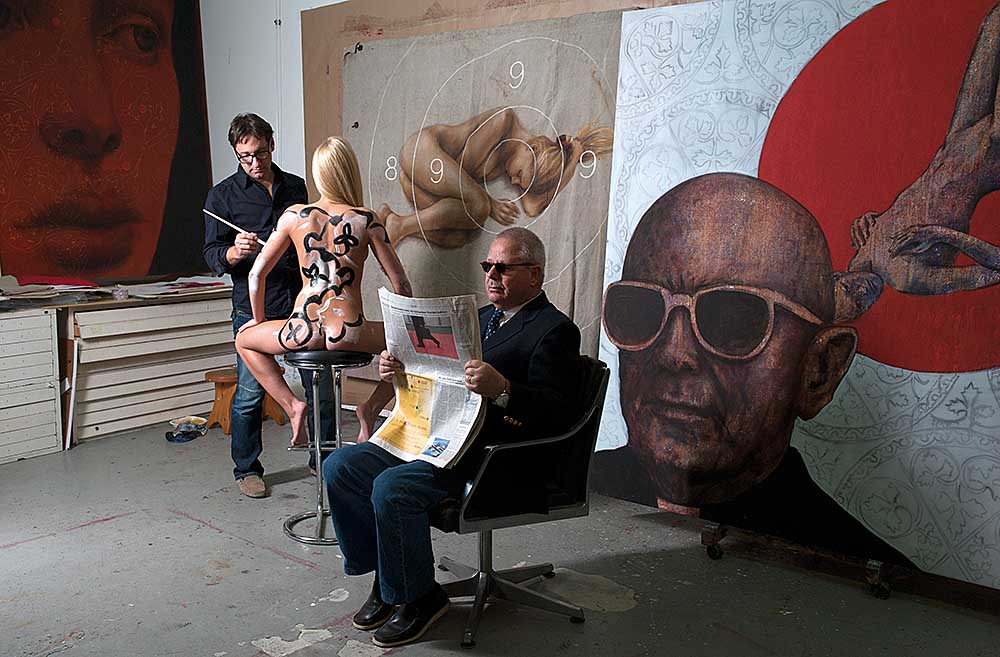
How hard was it to find his artistic path in an entirely new environment, among foreigners, in a foreign language, in the situation where the competition is vast and strong? It seems that for Ivica Arandus, when it comes to art, there have never been barriers.
"I have to say that it has never been hard for me because my fascination with art always led me. Art always preoccupied me that I often forgot a man had to work to earn to live and survive. I studied art at the Academy of Art in Dusseldorf in the class of Professor Michael Buthe. Already during my studies, I made exhibitions, and I never had the problem of selling some of my drawings or pictures. I have to admit that it was not difficult for me either during the studies or later when I started to be more serious about painting. But my approach to painting has always been serious. Initially, they declared me crazy; to people, it was not clear why I was not dealing with electronics, which could provide me with a good existence. Then they realised that it is normal for an artist because the artist could not live without his love and fascination with art."
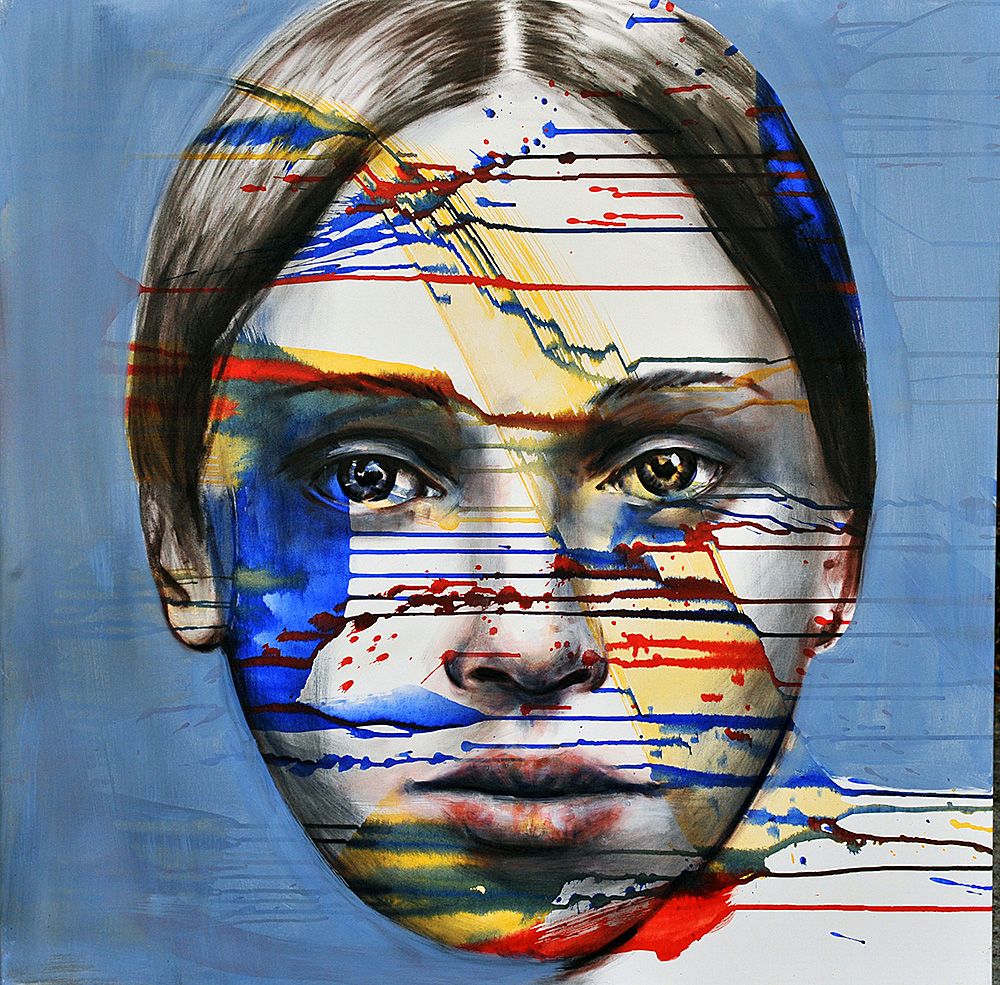 Although Arandus calls his poetics socio-critical, the first thing that the observer notices when accessing his work is the almost ever-present figure of a woman.
Although Arandus calls his poetics socio-critical, the first thing that the observer notices when accessing his work is the almost ever-present figure of a woman."A woman is a widespread motif in my paintings, but in essence, there is a great scene that has nothing to do with a woman. I respect a woman so much that I would hang on erotic or some sexual object. I'm playing with the figure of a woman, but dealing with topics that catch me. Religion, politics, and eroticism - the boundaries between these spheres have almost disappeared. When I do some critical picture on finance, I come again to eroticism - everything is seductively packed. Financial subjects are so attractively presenting their actions or some financial packages to attract people to deceive them. Logic is not much different than when it comes to pure eroticism. People get the impression that they have a chance to profit, and the goal is completely different in favour of the bidder. So, in the eroticisation of politics, finance, even religions, there is always a symbol of women. That is why the symbol of a woman is a metaphor, which I often include in my paintings," explains Ivica Arandus.
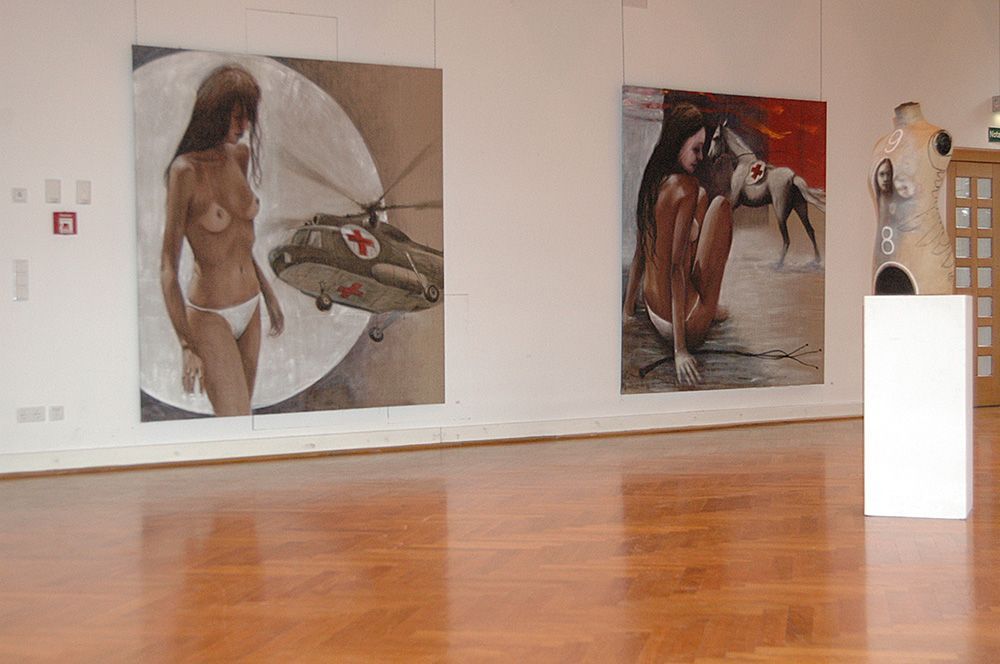
As a socio-critical artist, Arandus, through his works, dealing with the topics of religion, politics, economics and the military industry, succeeds in the artist's mission to play the map of thoughts and emotions, inspires audiences to observe reality and question the limits of their freedom critically.
"I've been painting for almost 30 years, and I'm sure that within the time I have formed some inner structure that I keep and constantly upgrading. I think freedom is our great illusion. An even greater illusion is a democracy, I would call it a demo-dictate of today. For my notion, we can build freedom only within ourselves. I think this is a form of being of every man- to be built up as a person, to have self-awareness about his knowledge and spiritual construction, to open his perception, to be critical of what is happening in society. I do not believe in democracy in the way we present it. The illusion is that the kind of democracy we know goes in favour of people. Every political system always has and everywhere went hand in hand to a minority that manages, no country has so far dealt with its inhabitants. No power, no big company ever cares about its employees, but their profit. The same principle works for the state."
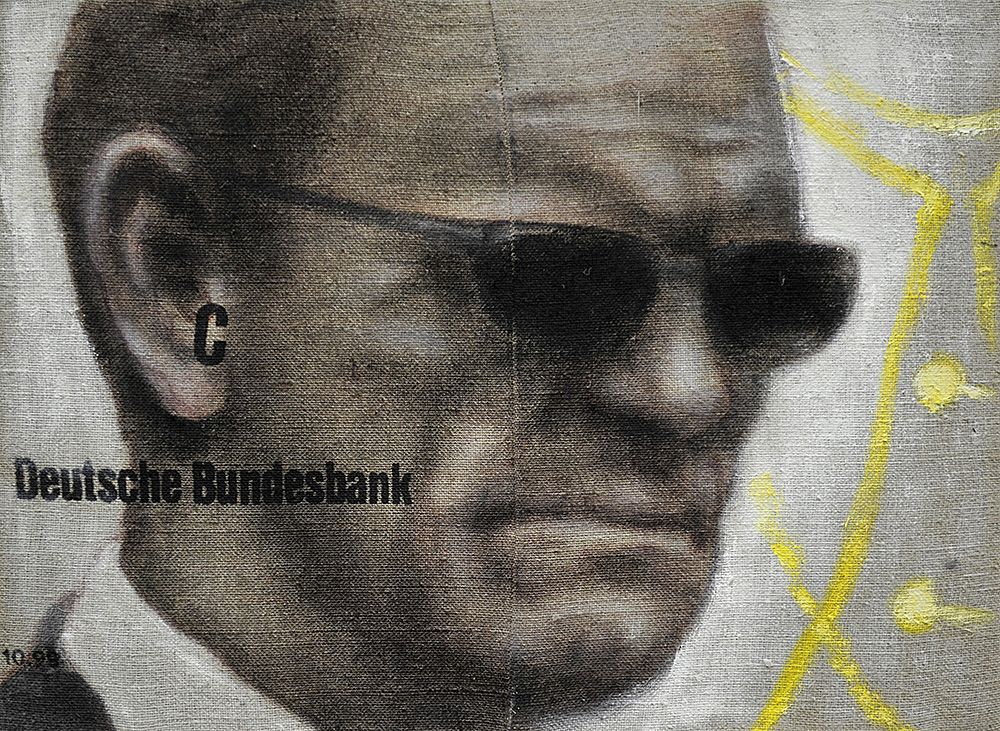
A good artist communicates with the audience in a way that inspires reflection and exhilarates feelings. At the same time, the most powerful means of manipulating people through history were those that affected cognition and emotions. In this sense, the Catholic Church is one of the longest and most influential organisations when it comes to broad masses. Arandus has dedicated the whole cycle of his work to the critique of the Catholic Church, and this cycle has caused the highest interest of the audience, especially in Germany.
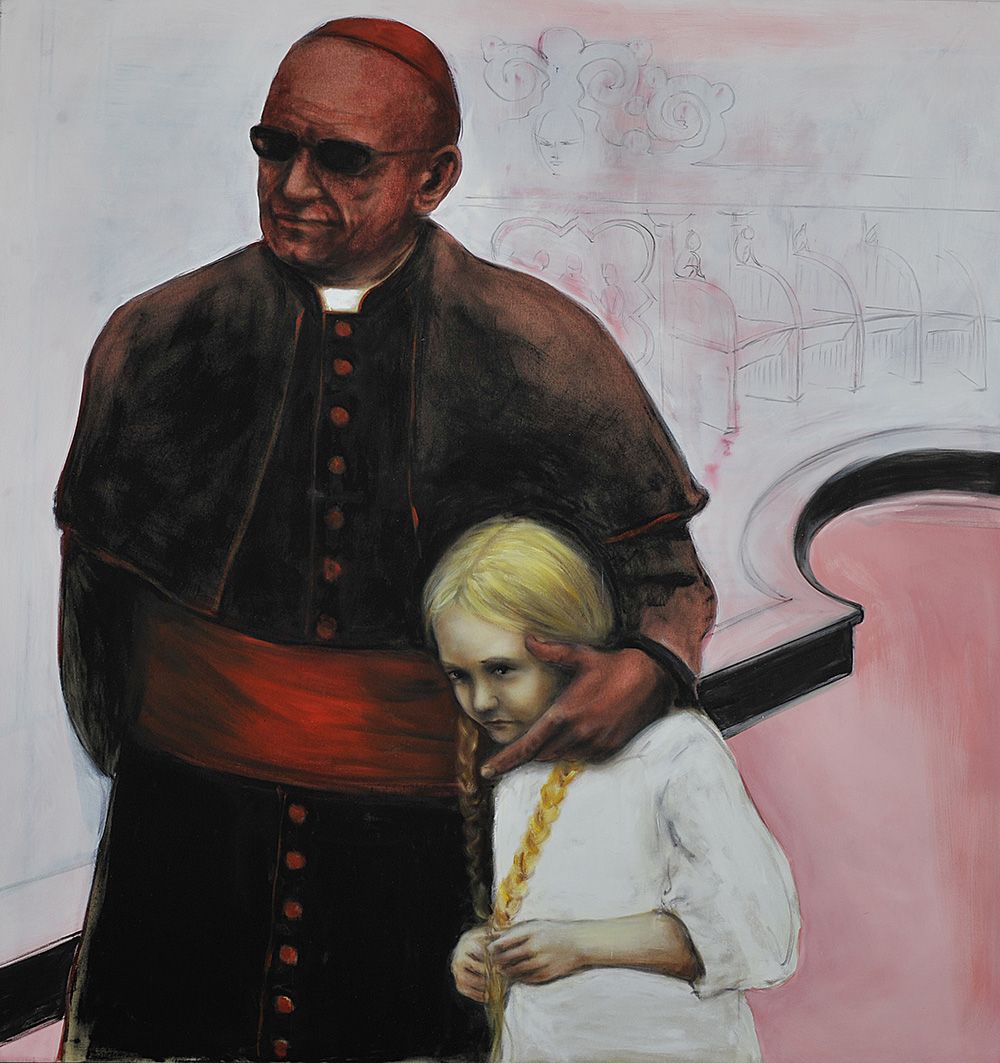 "Surprisingly, the series you're talking about is the best selling of all the thematic series I've been working on so far. I'm still working on it, and I cannot escape this subject because it keeps inspiring me. These are very critical images, but even strong Catholic families in Germany bought those paintings, which I could not believe. They are much more open than eastern countries, such as Poland and the countries of our region. Even in Italy, people are quite critical of the church. The Pope has recently released all bishops in Argentina. In Chicago, the church released about 900 priests for child abuse. In France, there is a trial against one of the major cardinals. Courts generally defend the hierarchy. If there is no pressure from the public, that there are no people to oppose it, it would all be stuffed and still unknown. In Germany there were over 2000 applications, which will ultimately lead to civilian courts. Until now, that was not possible, even the police did not have access to the church. Now it is slowly starting to go globally, people all over the world are slowly rising and retreating. Therefore, it is certain that the Church is one of the themes that will continue to be present in my creation because in my paintings I will continue to deal with the transgression of the spirit and illusions of man. There are certainly good things in religion, but there are also huge scams and exploitation of the population," says Arandus about one of his significant occupations in art.
"Surprisingly, the series you're talking about is the best selling of all the thematic series I've been working on so far. I'm still working on it, and I cannot escape this subject because it keeps inspiring me. These are very critical images, but even strong Catholic families in Germany bought those paintings, which I could not believe. They are much more open than eastern countries, such as Poland and the countries of our region. Even in Italy, people are quite critical of the church. The Pope has recently released all bishops in Argentina. In Chicago, the church released about 900 priests for child abuse. In France, there is a trial against one of the major cardinals. Courts generally defend the hierarchy. If there is no pressure from the public, that there are no people to oppose it, it would all be stuffed and still unknown. In Germany there were over 2000 applications, which will ultimately lead to civilian courts. Until now, that was not possible, even the police did not have access to the church. Now it is slowly starting to go globally, people all over the world are slowly rising and retreating. Therefore, it is certain that the Church is one of the themes that will continue to be present in my creation because in my paintings I will continue to deal with the transgression of the spirit and illusions of man. There are certainly good things in religion, but there are also huge scams and exploitation of the population," says Arandus about one of his significant occupations in art.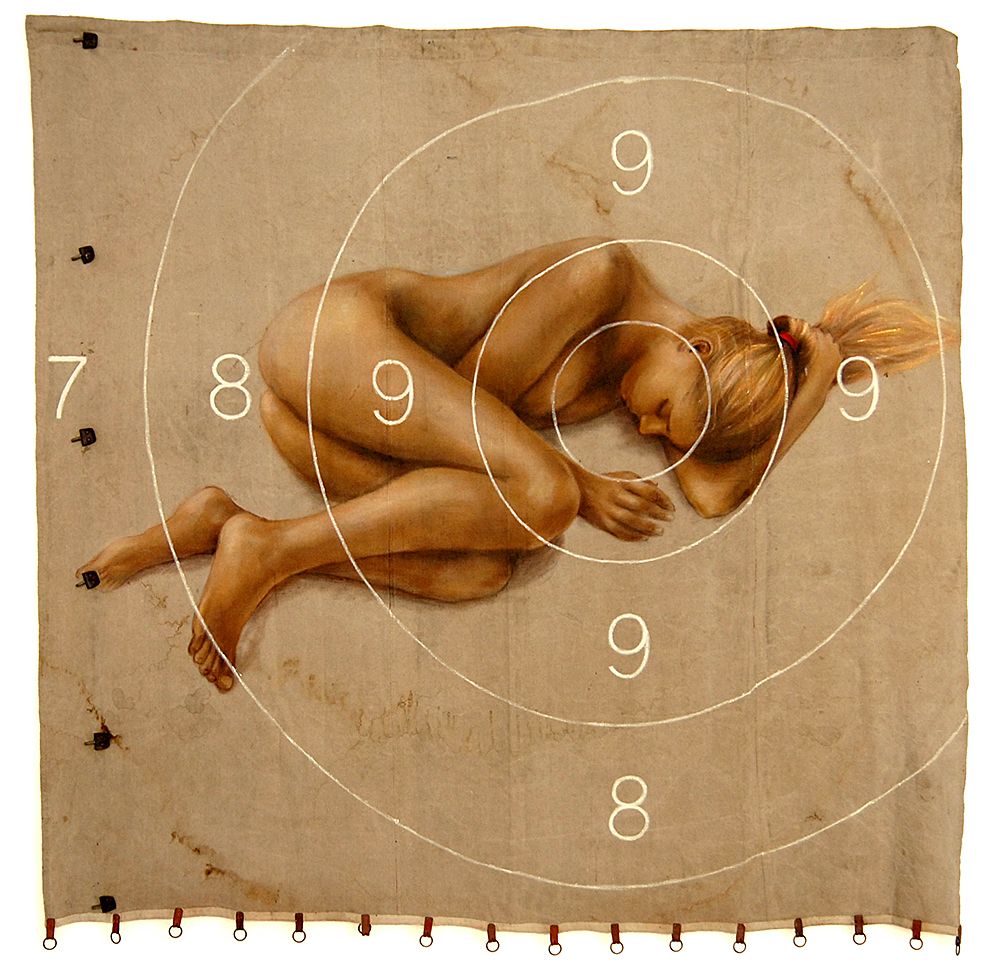 Although living and creating most of the time in Düsseldorf, Arandus is present in the art scene of Montenegro, where he has had several solo exhibitions in recent years. He also finds time to socialise with colleagues and occasionally participates in art colonies. Asked how to evaluate the position of artists in Montenegro and the Montenegrin art scene, Arandus answers:
Although living and creating most of the time in Düsseldorf, Arandus is present in the art scene of Montenegro, where he has had several solo exhibitions in recent years. He also finds time to socialise with colleagues and occasionally participates in art colonies. Asked how to evaluate the position of artists in Montenegro and the Montenegrin art scene, Arandus answers:"My opinion is that there are good artists in Montenegro, but there is no system of support for art and artists. There are missing good galleries and museums, which deal with artworks a bit more seriously. Mostly art falls into commercialism; images serve to decorate a space. I do not have anything against flowers and boats, but it can do to have a spiritual note. As the tone has a beautiful colour, so the picture has a nice sound. I guess that art is so commercialised here. The fact is that art cannot be without sales, artworks have to be sold to let the artist live and continue to create. But there have to be some line artists would not go over.
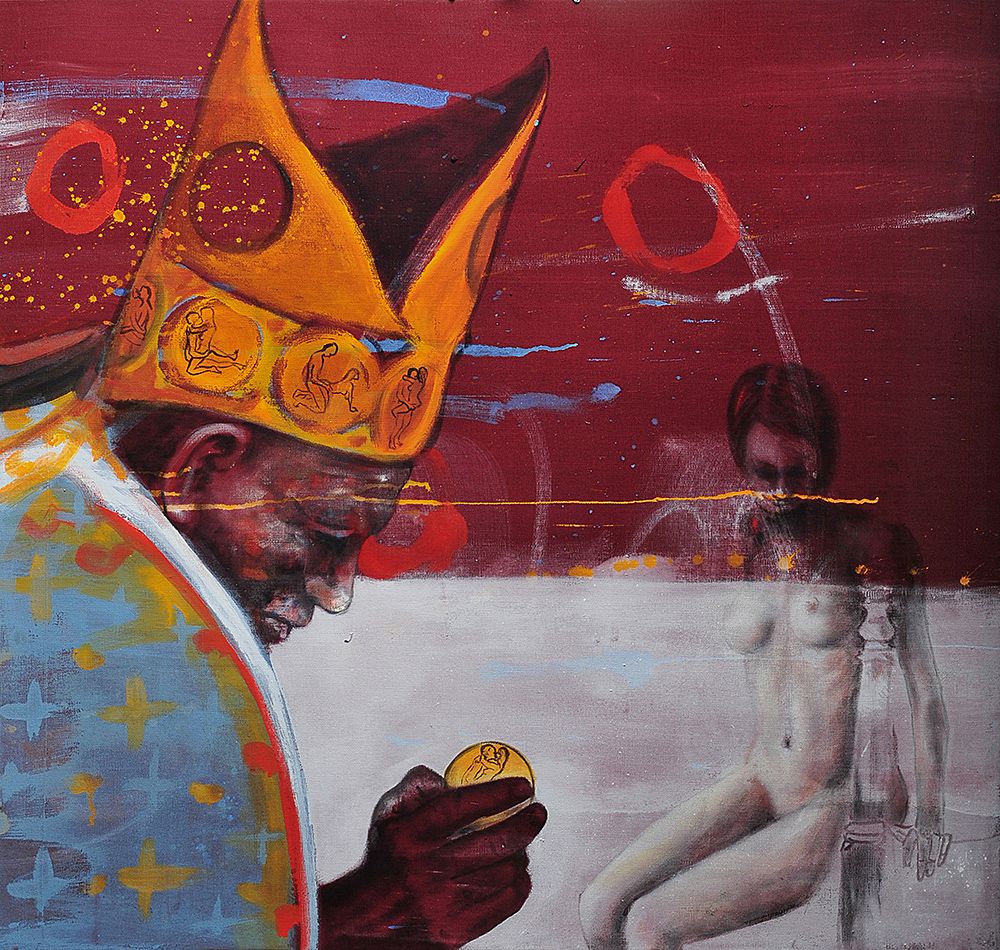 In Germany there is a huge competition, only in Dusseldorf, there are over a thousand painters. And there are maybe thirty galleries with where the artist can seriously work. But there are a lot of museums. I think it is needed to feel the competition in a positive sense. It is the competition that motivates you, which gives you the wings to do more and better. The situation is different in our country. I have countless times heard when asking for the price of the picture, so people comment that they can buy a car for that money. Still, the people in our country are more committed to investing in a status symbol, something that other people can see. You buy a picture and exhibit it in your home, and it does not have that effect. The same is with literature. When you read a good book, this is something that is good for you, although not transparent to others," the artist says.
In Germany there is a huge competition, only in Dusseldorf, there are over a thousand painters. And there are maybe thirty galleries with where the artist can seriously work. But there are a lot of museums. I think it is needed to feel the competition in a positive sense. It is the competition that motivates you, which gives you the wings to do more and better. The situation is different in our country. I have countless times heard when asking for the price of the picture, so people comment that they can buy a car for that money. Still, the people in our country are more committed to investing in a status symbol, something that other people can see. You buy a picture and exhibit it in your home, and it does not have that effect. The same is with literature. When you read a good book, this is something that is good for you, although not transparent to others," the artist says. "It is striking that in Germany more people visit museums than football stadiums. So art attracts more attention than football matches, which is almost unthinkable to us. When they come to bigger cities, tourists rush into museums because those are places where they can recognise the spiritual state of a nation. It is sad that the guests who come to us we can show only beaches and buildings. It is sad that every city does not have a large and representative gallery, where visitors could see how people are feeling here, how they are watching their world and the world at all. I think it is important for every society - to make its artists and their art accessible to citizens and visitors."
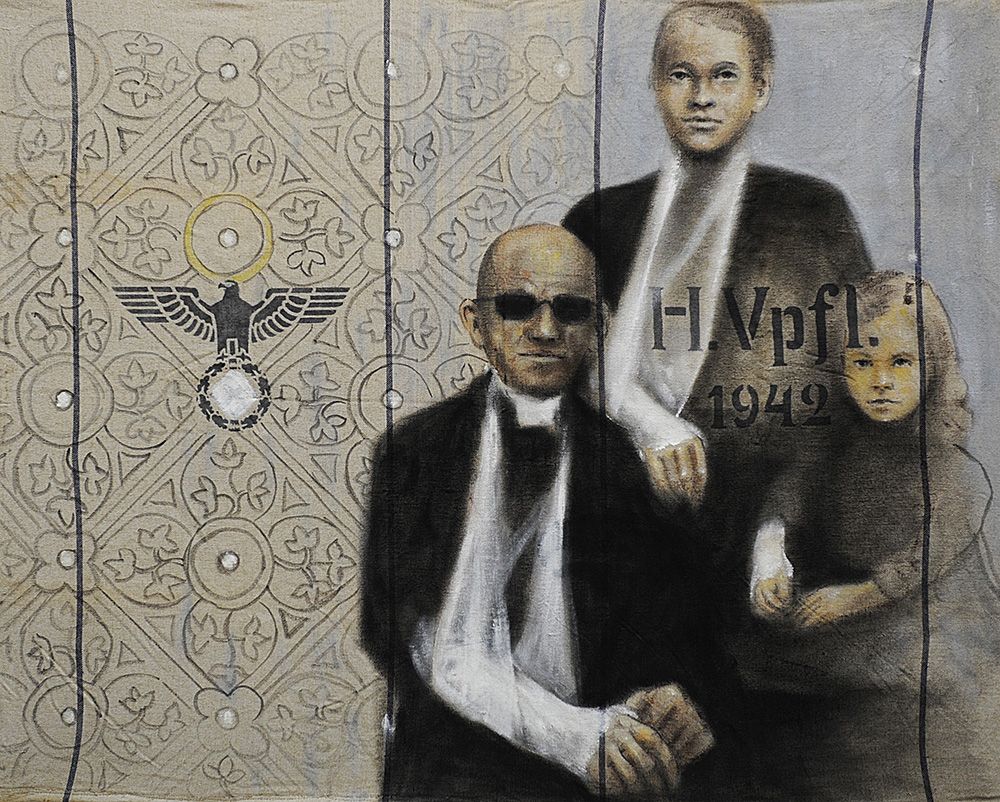
In 2004, Arandus presented a valuable collection of artwork by painters and sculptors from all over the world who gave their works to his hometown, supporting his idea of providing such a gift to the city as an opportunity to establish a museum of contemporary art. The "Düsseldorf to Tivat" collection will soon get its permanent address.
"These are the works of artists from all the meridians - from Africa, India, Asia, America, Russia, Japan, from different countries in Europe. My idea with that donation was to use it as the cornerstone of the future museum of contemporary art so that people get the chance to be informed and inspired by the contemporary flow of culture and art. So far, the public could see those works in the Tivat's gallery. I hope that this year, the municipality and responsible culture institutions will keep their promise and provide representative space for this valuable collection, so that my idea finally begin to live," said Ivica Arandus, one of the most successful Montenegrin artists on the international scene.





